In soapmaking, there are many natural additives that can be incorporated into your recipe to produce a luxurious soap that is so much better for your skin than the harsh chemicals of commercial soaps containing detergents.
Aloe Vera and Coconut Milk have both been known to have a moisturizing effect on the skin in addition to other benefits. Adding these to your homemade soap recipe, you can create a soap that has great cleansing qualities and is nourishing to your skin as well.
Although unsweetened store-bought coconut milk and 100% aloe vera can be used in this recipe, I try to use fresh-from-the-plant ingredients whenever they are available.
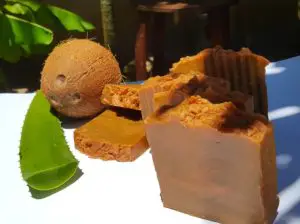
If this is your first time attempting to make soap at home, see my post How to Make Soap From Scratch for Beginners. Be sure to pay particular attention to the safety information.
If you would like a complete collection to learn how to make all natural soaps you can check out The Nerdy Farmwife, Jan Berry’s Natural Soapmaking Collection.
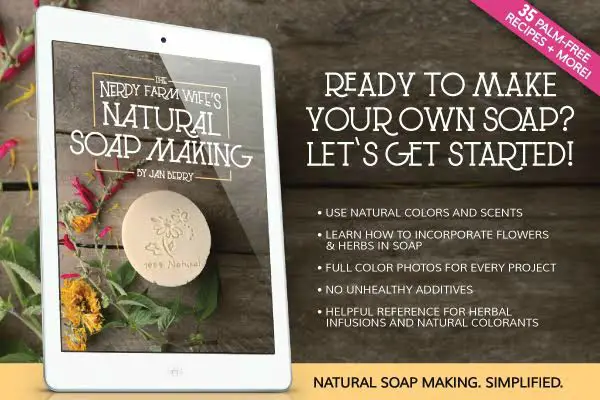
Ingredients
- 2 oz. Castor oil
- 2 oz. Cocoa Butter
- 12 oz. Coconut Oil
- 16 oz. Olive Oil
- 5 oz. Fresh Coconut Milk
- 3 oz. Fresh Aloe Vera
- 4.6 oz Sodium Hydroxide (lye)
- 5 oz. Distilled or Purified Water
- 1.0 oz. Papaya Coconut Fragrance Oil (Brambleberry) – optional
- 1 tsp. Copper Sparkle Mica (Brambleberry) – optional
Instructions
Ensure that all your safety precautions are in place. Cover your working surface to protect it from lye and raw soap.
Put on your gloves, long sleeves and safety glasses.
Prepare The Lye Solution
Weigh out your lye.
In a heat-resistant container, weigh out your water.
Note: The water in this recipe is reduced to accommodate the liquids in the coconut milk and aloe vera.
In a well-ventilated area, add the lye to the water and stir with a stainless steel spoon until it is dissolved and the lye solvent is clear. Ensure that you do not inhale the fumes.
Set aside the lye solution in a safe area away from pets, children and family members to allow it to cool.
Now, prepare your coconut milk and aloe vera puree.
How to Make Coconut Milk
Ingredients
- 1 Dried coconut in the shell or 1 1/2 cups frozen grated coconut
- 16 oz. (2 cups) of bottled or purified water
Note: If you have access to frozen grated coconut, proceed to blend the coconut as described below to obtain the milk using two cups of water to 1 1/2 cups of grated coconut.
First, break open the hard coconut shell over a bowl in order to collect the coconut water, as we will use the coconut water in the milk. I use the blunt backside of a Chinese chopper to break the shell, usually, one or two hard knocks are enough to get it open.
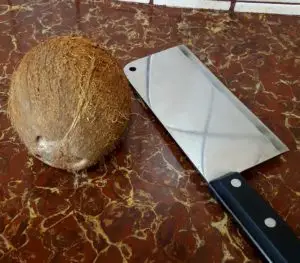
Next, using a butter knife, insert the knife carefully between the white coconut jelly (some call it coconut meat) and the shell. Shuffle the knife gently a few times moving it further into the coconut jelly. This helps to separate the jelly from the shell.
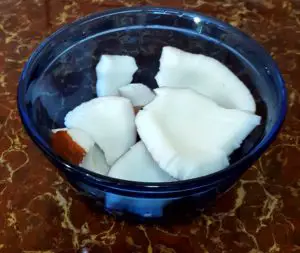
In a blender, add the washed pieces of coconut, all the coconut water and about a cup and a half of purified bottled or distilled water. Your liquid should total about two cups in all. Depending on your blender, you may have to cut the coconut into smaller pieces, to make it easier to blend.
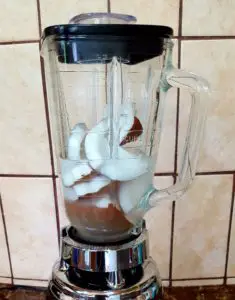
Blend the coconut on high speed to an almost smoothie-like consistency. This is to extract as much of the coconut milk out of the jelly as possible.
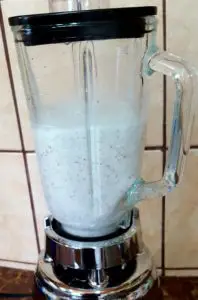
Next, strain the liquid to remove the milk. Squeeze as much of the milk out of the fibre as you can.
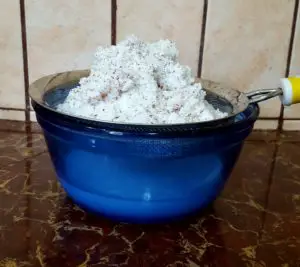
Set aside your coconut milk. Store it covered in the fridge while you prepare your other ingredients.
How to Prepare Fresh Aloe Vera
Ingredients
- 2 large Aloe Vera leaves
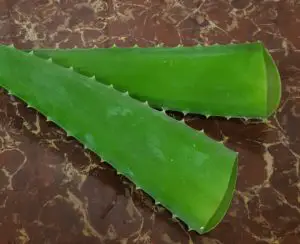
Using a knife, cut the skin of the aloe away from the gel as close as you can. It is okay if a little bit of green is left from the skin but try to remove as much of it as possible.
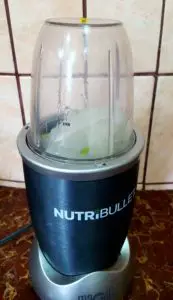
In your blender or NutriBullet, puree the aloe gel completely until it forms a white froth almost like whipped egg whites. Strain the puree to remove any lumps or pieces.
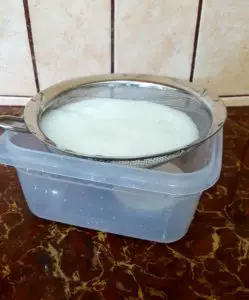
Weigh out 3 oz. of the puree, cover and set aside.
Related Post: How to Start A Soap Making Business for Beginners
Prepare your oils and cocoa butter
Weigh your oils (castor, coconut and olive) individually and add them to the mixing bowl one at a time.
Weigh your cocoa butter and place it in the microwave in a microwaveable bowl. Depending on the power level of your microwave you can microwave it in 30-second increments just enough to melt it completely. If you choose not to use a microwave, you can use a double boiler on the stove. Remember to heat it only enough to melt it.
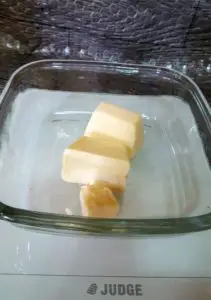
Add the melted cocoa butter to the oil mixture.
Note: If your coconut oil is also solid at room temperature, you will have to melt it as described above before adding it to the mixing bowl.
Prepare Fragrance and Colour
Next, weigh your fragrance oil in a glass bowl. Do not use plastic as fragrance oils tend to degrade plastic.
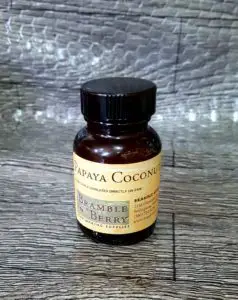
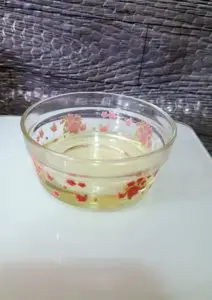
In a small cup, dissolve the Copper Sparkle Mica thoroughly in about 1 tablespoon of coconut oil.
Make The Soap
Remove the coconut milk from the fridge and stir it as the coconut cream will rise to the top. Weigh 5 oz of coconut milk. Put the remainder in the freezer for another soaping project or to cook an awesome curry for the family later.
Add both the coconut milk and aloe puree to the oils in the mixing bowl. Using the stick blender, mix well to blend.
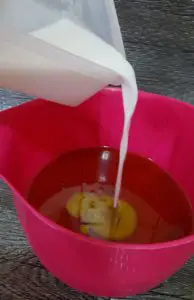
The mixture will be thick and almost like traced soap.
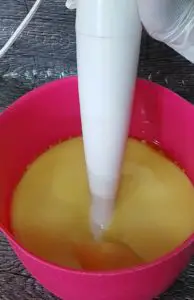
Add the lye to the mixing bowl and stick blend it until it reaches trace.
Add the fragrance oil and blend enough to mix it in thoroughly.
Pour about half of the soap into another bowl and add the Copper Sparkle Mica. Mix well.
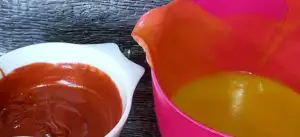
Pour the mica mixture into the first bowl and mix it gently but not all the way through. This will create a subtle marbling effect.
Put your soap in the mould. Use a silicone spatula to scrape all the soap out of the bowl.
You can use a stainless steel spoon to create texture on the top of the soap.
Put the mould in an open yet undisturbed area to allow the soap to set for 24 hours.
Related Post: Mango and Coconut Handmade Soap Recipe
After 24 hours, check that your soap has hardened and is ready to cut. If not, leave it for another 24 hours before cutting.
Remove the soap from the mould, cut the loaf into bars, and place them in an area where they can dry and cure for 4 to 6 weeks. During the curing period, turn the bars of soap occasionally to allow them to be exposed to air on all sides.
When they are ready to use, enjoy the lather and luxury of bathing with your own soothing coconut, and aloe vera soap.
Edit: I would like to thank one of my readers, Norman in Jamaica, for making and sharing his lovely version of this coconut aloe vera recipe.
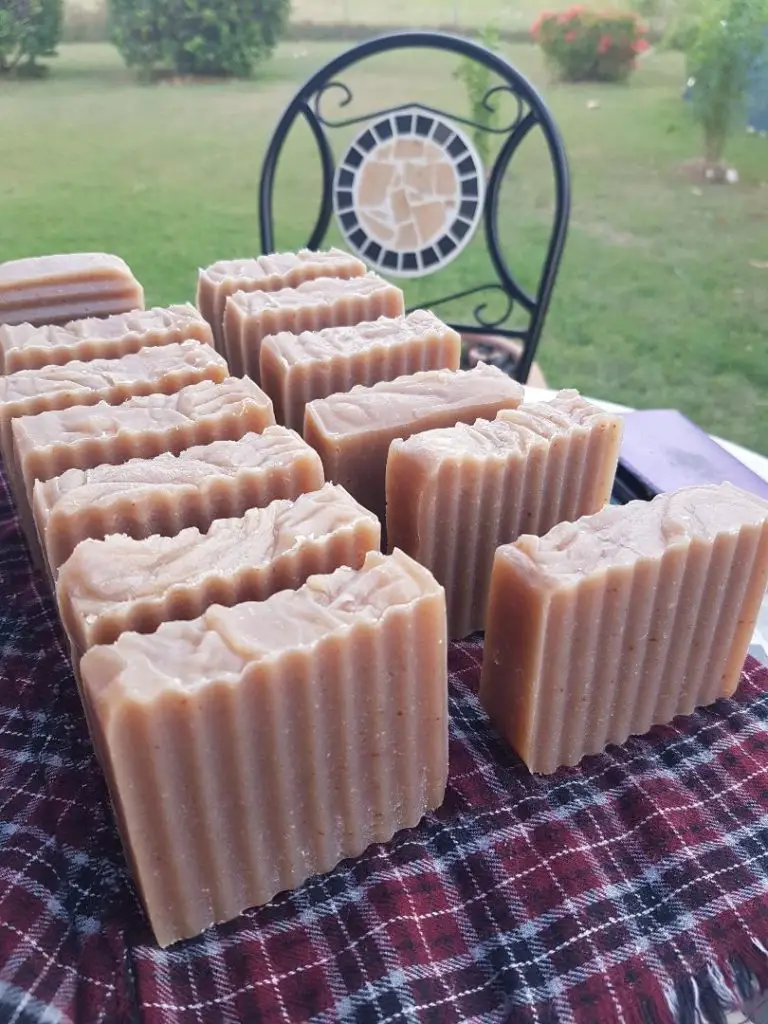

I don’t think it’s right way to add the lye with all ingredients put together.
The lye should be added to the oil and after forming the soap solution, then only other ingredients has to be added..
May be you can clarify
Hi Ananda, thanks for your comment.
Typically, in soaps made with milk, the lye is added to the milk under controlled temperature conditions to avoid scorching the natural sugars contained in the milk. The milk can be cold or frozen to avoid this, then once the sodium hydroxide is dissolved in the milk, it is added to the oils. I have found that with goatmilk for example, it is best to freeze the milk and I have no issues when adding coconut milk so I don’t freeze it and I add it to the oils. Also, this recipe has a water discount for the liquids used and the sodium hydroxide solution is not dissolved below the minimum 1:1 recommendation.